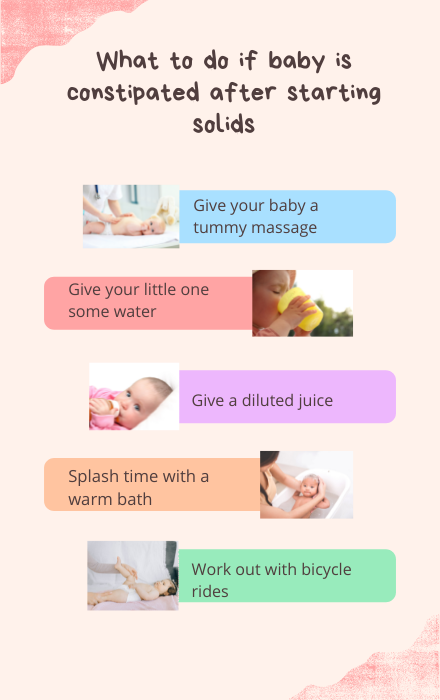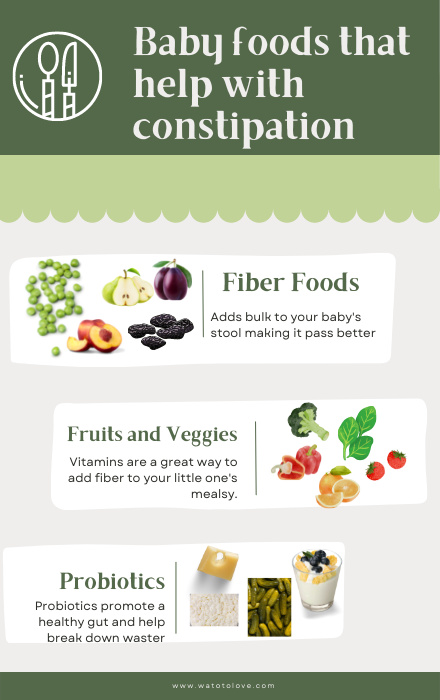When my firstborn started solids, I remember how excited I was buying cute utensils, bibs, and all that food-related glam. But, after a few feeds, I noticed she would turn red when pooping. Oh no, my baby was constipated! As a new mom, at 23, I had no idea what to do, but if you are in the same situation, worry not. I got you.
Table of Contents
Is your baby really constipated?
Many parents get worried when their babies don’t pass stool after a few days. This is mainly because you are taught that a baby has to have a bowel movement each day, which frankly isn’t always the case.
Each baby has a unique digestive system which means they could either pass stool each day, a few days apart or even weeks apart. As long as your primary doctor gives a green light, there is no cause for alarm.
So, what is constipation?
Constipation is when your baby has a hard time passing poop and when their poop is pellet-like, something similar to rabbit poop. The pellets may still be stuck together, but as long as it’s hard and pellet-like, then your little one is constipated. Other signs include:
- Excessive straining during bowel movement
- Blood, either red or black, in your kiddos poop
Is it normal for babies to be constipated after starting solids?
Yes, it’s actually quite normal for your little one to be constipated when they start solids. In fact, most first foods, including rice cereals and squash, cause constipation in little ones. Let’s dive in a little more and see why your 6-month-old baby may be constipated after starting solids.
What causes constipation in babies when they start solids?
- First eating foods with low fiber: This includes bananas, low fiber cereals, etc.
- Dehydration: Babies don’t need a lot of water, but when they don’t get enough of it, either from breastmilk or formula, they will become constipated
- Transition to solids: your little one’s digestive systems may be ready to work on more complex foods, but it takes time for them to adjust. For instance, the sudden increase in iron or low fiber intake can cause constipation because your little one’s digestive system is still adjusting.
- Allergies: Most babies also start taking cow milk when weaning. If your little one has an undiagnosed allergy to it and other dairy products, they could get backed up.
- Change in routine: Starting solids means your little one’s feeding routine also changes. This change may slightly confuse their digestive system and thus, cause constipation.
What to do if your little one is constipated after starting solids?
I get it. It’s not pretty when your 6 month old baby is constipated after starting solids. Seeing them struggle is worrying, and you want to help them get relief. So, what can you do when your little one is constipated?

1. Give your baby a tummy massage
Also commonly known as touch therapy, giving that little tummy a massage is effective in relieving constipation. The gentle pressure on your baby’s belly encourages bowel movement.
2. Give your baby some water
When under one, giving your baby some water is unnecessary, especially if you are still breastfeeding them since breastmilk contains 87% water. However, you want you can give them a few oz of water each day to help with bowel movement. Around 2 to 4 oz should be enough per day.
3. Give a diluted juice
Fruit juices such as prune or apple juice are great laxatives. Start by giving your little one an ounce or two to help each day and increase the intake gradually until it solves the problem. Ensure you mix the juice with some water though. But be careful not to give too much since pediatric dentists warn against cavities caused by too much juice intake.
4. Give your baby a warm bath
A warm bath is said to help your baby’s muscles relax, which reduces the abdominal discomfort and pressure your little one feels while constipated. Most babies love bath time, plus getting some splash time should be fun.
5. Use bicycle kicks
Even in adults, working out helps with regular bowel movements, which is the same case for babies. Bicycle kicks in particular stimulate the contraction of the intestine muscles, helping poop pass along more easily and also encourages regular bowel movements.
How do you prevent constipation in babies?
Honestly, it’s difficult to say that the 6 month old baby constipated after starting solids problem will end immediately as too many things come into play during this stage. However, there are simple remedies you can use to ensure the frequency reduces significantly or even goes away completely. You should:
1. Use baby-led weaning method
Starting simple through baby-led weaning can help you identify the foods causing constipation in your baby. Baby-led weaning means you introduce one type of food a few days apart and see how your baby reacts to it. For instance, give them a pear and don’t feed them anything else for three days or until you are sure it doesn’t cause constipation or they are allergic to it.
2. Avoid foods known to cause constipation
As mentioned earlier, there are foods known to cause constipation in babies. Also known as ABC foods, they include applesauce, cereals, especially rice cereals, and bananas. These foods are binding, which can lead to constipation in your 6 month old baby.
3. Increase fiber foods that promote laxation
Fiber naturally adds bulk to your baby’s stool which allows it to pass better. Some foods also help in drawing water from the large intestines through osmosis. This water adds moisture to the stool, making it softer and easier to pass.
4. Reduce iron in their meals
Iron is essential for your little one’s health, but it can cause constipation. If you have been feeding your little one iron-fortified food each day, try to reduce the intake to a few days a week instead. Supplement this with other iron-rich foods like lentils, chicken, and tofu.
5. Add probiotics to their diet
Probiotics help the healthy bacteria in the digestive system break down waste, making it easier for your baby to pass stool. In fact, adults are told to increase probiotics in their diet if they suffer from regular constipation, so it will work for your baby too.

Baby foods that help with constipation after stating solids
- Fiber foods: These include fruits, vegetables, and whole grains. Here’s a fun fact, high-fiber fruits and veggies happen to start with the letter “P” and include peaches, peas, plum, pears, and prunes.
- Foods that promote laxation: Think of apricots, berries, beans, kiwi, lentils, seeds, molasses, nuts, and whole grains.
- Probiotic foods: These include Greek yogurt (or yogurt with live cultures), kefir, pickles, buttermilk. Avoid dairy products if your baby is allergic.
Should I stop solids if my baby is constipated?
No. Your little ones’ body is ready for this messy yet exciting time, so there is no need to stop solids. While you may be tempted to stop for a while so your little one’s digestion system can reboot, it’s not necessary. Instead, use the remedies discussed below to help with constipation.
Baby constipation: When to worry
If you see blood in your baby’s stool or when constipation is a constant struggle even after trying all the methods outlined here, then it’s time to worry and visit your doctor. Constipation may also be a sign of motility issues, allergies, and other ailments, especially when it’s a constant struggle for your little one.
It also causes a lack of appetite, which means your baby won’t be getting the nutrients they need each day. You also don’t want your baby to learn that they must struggle or push hard to pass stool. It should be an easy, smooth process, which is why babies make that satisfied, happy face when they poop.
6 month old constipation Bottom line
It’s normal for your little one to get constipation once they start solids, but if the problem persists, be sure to take them to a pediatrician for further diagnosis. If it’s a once in a while occurrence, you can use the remedies outlined here to relieve your child.



